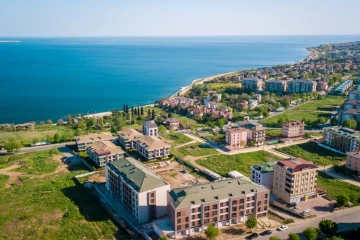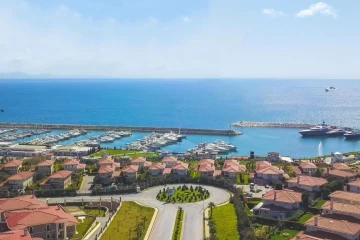All you need to know about the law of inheriting real estate for foreigners

Content Index
Inheriting real estate in Turkey for foreigners is one of the basic legal issues that concern foreign investors, and it is questioned by many as one of the important topics for moving forward to buy and own real estate in Turkey and reassurance of the fate of the property in case of any emergency such as death, the lack of a conclusive answer one of reasons for their reluctance to buy real estate, especially if the answer is from non-specialists, and although Turkish law has resolved this issue with the possibility of inheriting real estate owned by foreigners in Turkey and transferring its ownership to their families and relatives, as Turkish law allows foreigners in Turkey to own real estate of all kinds, such as land, apartments, villas, offices, and others, Also, foreigners are allowed to own real estate in Turkey by inheritance, as the legal heirs have the right to transfer the ownership of real estate in Turkey from the owner after his death to them, But with the lack of knowledge of foreigners about Turkish language, investors may find it difficult to find formative and informative answers to their many questions despite the existence of the law. In this article, we will try to answer the questions that come in the investor’s mind about inheriting real estate in Turkey, and who deserves to inherit the investor after his death, and by what law will be applied in inheritance transfer, will Turkish law be applied or according to the country of the deceased, and how to transfer the inheritance to the heirs.
Important definitions in Turkish law:
1- Inheritance:
It is the “legacy of the deceased”, it is all the properties, titles, debts or responsibilities owned by the deceased upon his death, and properties are divided into fixed assets like lands, companies, real estate and others, or non-fixed assets or non-cash assets such as shares and bonds in the stock exchange and also in-kind assets.
2- Heirs:
They are the persons entitled to inherit from the estate of the deceased, and Turkish law determines the heirs of the deceased with his family from the partner and children, which is the first degree of the family of the deceased, unlike Islamic law, which allows inheritance to relatives of the second degree who are parents and siblings, as well as relatives of the third degree including uncles, aunts, and the inheritance is divided for them as long as the property of the deceased person is in Turkey, and there is no difference between whether the heirs live inside or outside Turkey, but they must submit a request from one of the heirs of the deceased person in Turkey to the competent court in order to divide the inheritance in Turkey, where They can request the division of inheritance either according to the law of Turkey or the inheritance law of their countries.
Inheritance of real estate in Turkey:
It is the transfer of ownership of the property from the real owner after his death to his legal heirs, males and females, according to specific laws, and any foreigner has the right to distribute his estate from real estate in Turkey to his children and legal heirs, and they obtain the privileges of owning real estate in Turkey.
Principles in Turkish Law:
A- The principle of equality in inheritance:
Although the Turkish Republic is an Islamic state, but at the laws of inheritance and marriage does not follow Islamic law, but rather follows European civil laws. For example, the inheritance law in Turkey equals male brothers and female sisters in the division of inheritance, which is something that needs to be alerted to foreigners in Turkey, meaning that they can request the division of inheritance according to the laws of their countries from which they came from.
B - The will comes first at inheritance:
The origin of inheritance in Turkish law is the will that the investor leaves after his death to determine who will inherit from his relatives, as the distribution and division of the inheritance in Turkey is not done until after ensuring the implementation of the deceased’s will, or verifying that the deceased did not leave a will recommending the transfer of ownership of some his money to specific people outside his relatives, and there are 3 types of the will:
- Oral will: It is used in certain circumstances such as war or illness, where the person tells two witnesses to write what he tells them, and the will is valid for one month in case of the state of emergency is over and the person is still alive "Article 539-541".
- Official Will: It is written by an official government employee (a notary, an officer or any other official authorized by law) and two witnesses according to Article 532-537" of the Civil law in Turkey.
- Written will: It is written in the testator's handwriting, with the date specified on it mentioned, and the signature of the testator on it, and any other signature other than the owner of the will invalidates it in accordance with Article no 538.
The official will is considered the best among them, because it is registered by notaries, and anyone over the age of 15 can leave a will in Turkey, and here it must be noted that in case of the deceased leave a will, he should certify it at the Notary Department, and for foreigners, the will of one of them should be recognized in Turkish law and certified by the Noter as well.
The investor who owns a property within the borders of Turkish territory has the right to write a legal will recommending the transfer of the property after his death to a specific person. This is guaranteed by Turkish law to the investor under specific conditions as a foreigner, including that the investor must be over 15 years old and be in full possession of his mental powers.
The will is done in three ways, either official and certified by the notary in the court, or written by the investor’s hand, and he has to certify it at the notary public in the presence of two witnesses.
The share of heirs in the inheritance:
The property of the deceased is distributed to the previous categories after the inheritance is discharged, if there are any debts of the deceased should be paid first whatever for the banks, or any instalments, or any mortgage and alike.
According to Turkish law, the wife has half the property and the children inherit the other half, and the shares of males and females are equal, this is why some investors ask about the possibility of following the laws of their country in the distribution of inheritance, which is permissible provided that it is applied to all heirs.
The investor should take into account that Turkish law does not differentiate between male and female, each half equally after the half is calculated for the husband or wife, and anyone of the heirs has the right to demand the implementation of the law in force in their country of origin.
The required documents to transfer the property to the heirs:
- A family statement from the Department of civilians in the country of the deceased, indicating who the main heirs are.
- Tax numbers for the heirs
- A valid passport net less than 6 months
- 2 personal photos
Inheriting the property to the sons of investors holding Turkish citizenship:
The inheritance of the deceased is distributed according to Turkish law or the law of the country of origin of the deceased after the approval of all the heirs.
Inheriting the property to non-naturalized foreigners:
If the investor is not a Turkish citizen and has a real estate residence permit, the inheritance is subject to one of the cases of inheritance, which are 3 cases in Turkey:
A- If the country of the deceased was within the Hague Convention:
If the foreign deceased held the nationality of one of the signatory countries to the Hague Convention, the heirs have the right to bring the inheritance information documents and the family statement, and after their translation into Turkish and certified at the notary in Turkey, they are approved in Turkish courts and the inheritance is distributed according to Turkish law or the law of the deceased’s original country according to the request of the heirs, and The Arab signatories countries to the Hague Convention including Saudi Arabia, Egypt, Jordan, Tunisia and Morocco.
B- If there is a reciprocity agreement between Turkey and the country of the deceased:
In case of the country of the foreign deceased does not exist within the Hague Convention, the court looks at the treatment received by the Turks in the country of the deceased, and accordingly if there is a principle of reciprocity between the two countries, the heirs should submit their documents and the family statement from the original country of the foreign investor, then translated and certified, a transaction is initiated inheritance in Turkey in the specialized courts.
C- In the absence of the previous two options:
In this case, the heirs need to file a lawsuit in the Turkish court to demand that the inheritance statement from Turkey, and the court will verify the declaration of death and identify those the heirs who worth the inheritance and those who are entitled to it by making contact with the competent authorities in the deceased’s home country after granting the heirs notification document from Turkey. Inheritance confinement in the Turkish court naturally.
At Ramzy Real Estate Company, we are glad to accompany you on the journey of buying property in Turkey and to provide you with a range of services to make the process smooth and easy , as we are always keen to present a variety of options for residential and investment properties in addition to helping you obtain Turkish citizenship for those looking for it.
Our services:
- Legal advice.
- Property Management.
- After-sales services.
- Legal services and obtaining Turkish citizenship.
- Buying and selling real estate in Turkey.
- For more details, you can contact us via the communication platforms or via the WhatsApp attached on the site.
Editing by Ramzy Real Estate Team ©
Related articles:
Turkish citizenship by investment
Istanbul property prices 2020-2021
Turkish citizenship by buying property
Real estate prices in Turkey 2020-2021
Villas for sale in Istanbul European side
obtain permanent residence in Turkey
cheap apartments for sale in Istanbul 2020-2021
#Ramzy_real_estate #real_estate_investment
#apartments #istanbul #turkish_citizinship





















